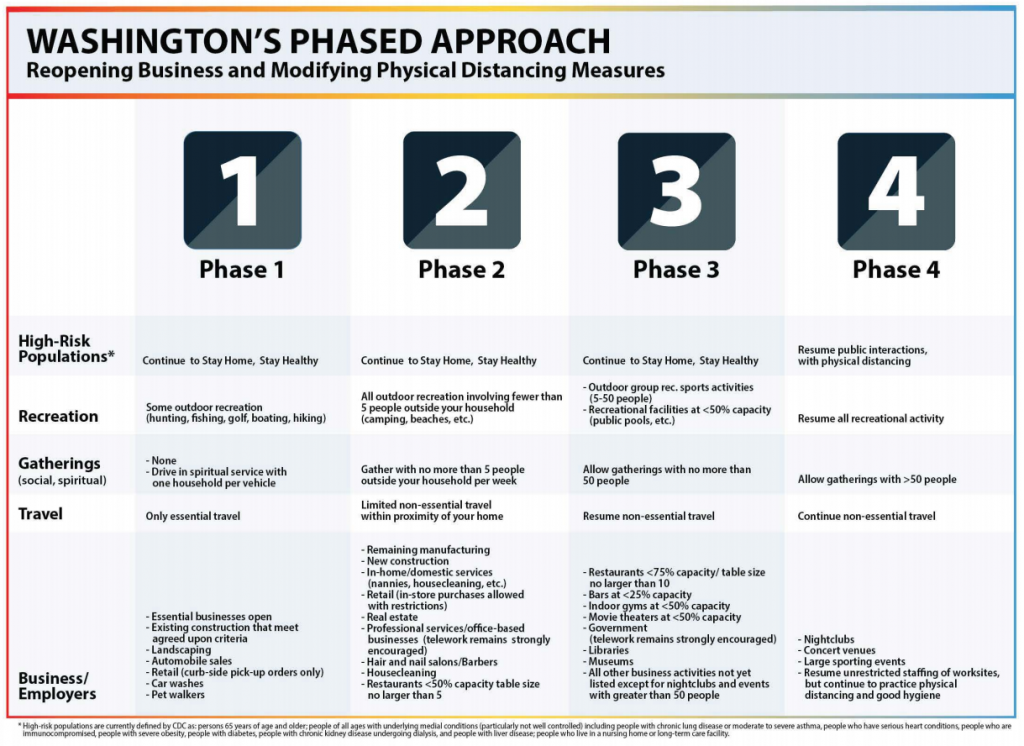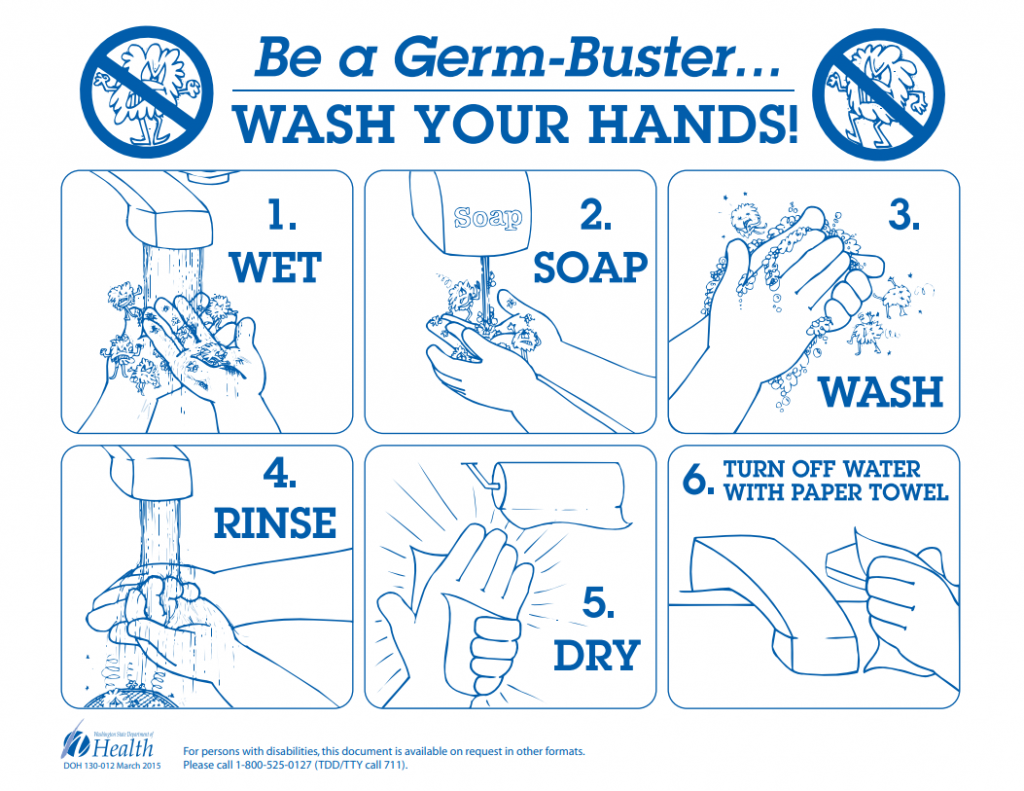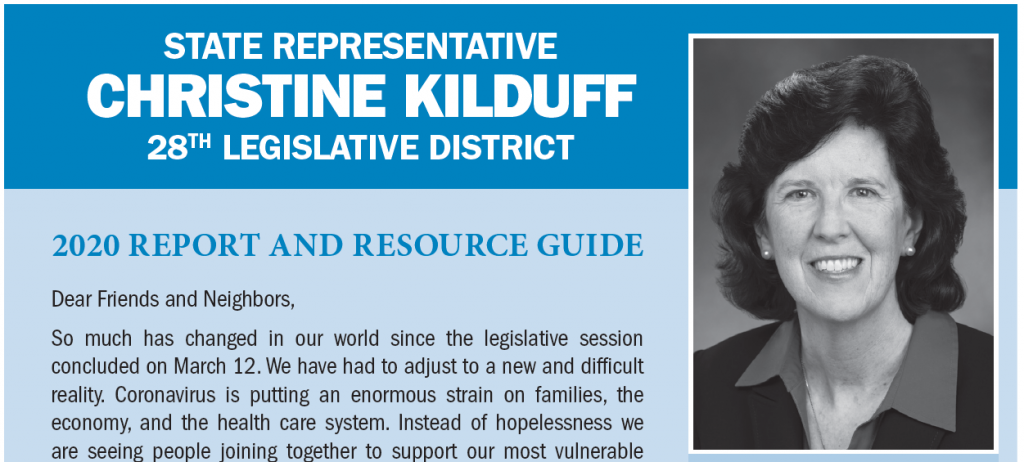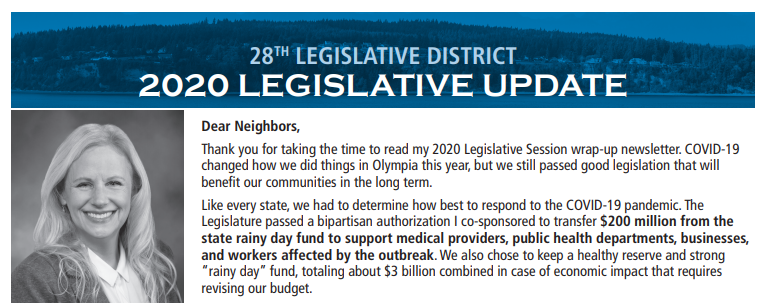Dear Friends and Neighbors,
Constituents across the 28th have asked us many questions about the pandemic. We have been listening to your concerns and seeking ways to get you as much information and as many resources as possible at this critical time.
Changes in Our Communication Are Coming
During an election year, there are certain restrictions on our communications to prevent the use of state resources for election purposes. One of these restrictions is a freeze on mass communication. This means no new mass emails such as this can be sent beginning May 11, 2020 until after the general election in November. That restriction is lifted if we enter a special session between now and November. If you have questions or comments about legislative issues, we can still respond. Please kindly continue to contact us using our contact information below. We welcome the opportunity to assist you.
As this is potentially the last mass communication you will receive from us this year, we wanted to make sure you had the latest information on the state of Washington’s response to the COVID-19 pandemic, how you can get more information, and how best to access resources to help you and your family.
Washington families have sacrificed so much, and our state has proven that we are capable of leading the country in this difficult time. We are both proud to call the 28th District home and it is our honor to serve as your Representatives.
We hope you and your families stay healthy and safe.
 |
 |
A Phased Approach to Re-Opening Washington
Last week, the governor announced a phased approach to how the state will begin re-opening different sectors of the economy safely. The goal is to use a data-driven, gradual approach that leads us down the safest and fastest road to recovery. After almost two months, we know that the “Stay Home, Stay Healthy” order is successful at beating COVID-19, and that hundreds of Washington lives have been saved because of it. But once we start re-opening government offices, businesses, work sites, restaurants, bars, and churches, things could change dramatically, and our healthcare system can be overwhelmed with hundreds or thousands of new cases almost overnight. That’s why a phased approach is the right way to go.
It’s a really hard balancing act because livelihoods are threatened, as COVID-19 continues to wreak havoc on our economy. But staying home better protects our loved ones, essential workers who are making sure food is available in our grocery stores, healthcare workers taking care of those who are sick, and truckers who are moving critical products to communities. We can get through this, but only if we support one another.
The governor’s phased in approach is below. We are currently in Phase One, with some recreational activities and construction resuming on May 5. As industries develop processes and protocols to safely operate, they can also potentially resume operations.
Over the next few weeks and months, we will enter the next phases to open up restaurants and small gatherings, movie theaters and government buildings, and eventually larger gatherings of 50 or more people. For some counties, moving into other phases might happen faster than others. This will take time and may be slower than anticipated depending on testing capacity, healthcare system readiness, and our ability to protect high risk populations, like those with compromised immune systems.
Read the entire “Safe Start Washington” plan by clicking here.
Even as we move into different phases, it’s important we stick to the safety measures we have taken these last few months:
- Engage in physical distancing of at least six feet
- Wear cloth face coverings in public places when within 6 feet of another person and not eating or drinking (cloth face coverings should not be placed on children younger than 2 years of age, anyone who has trouble breathing, or is unconscious, incapacitated or otherwise unable to remove the cover without assistance)
- Stay home if sick
- Avoid others who are sick
- Wash hands frequently with soap and water (use hand sanitizer if soap and water are not available)
- Cover coughs and sneezes
- Avoid touching eyes, nose, and mouth with unwashed hands
- Disinfect surfaces and objects regularly
Staying Informed and Getting Assistance
Even though we have shared some of these resources with you in the past, here is a comprehensive list of resources that may be useful in the coming weeks or months:
- Frequently asked questions for businesses
- How to file for unemployment benefits (4 steps)
- Unemployment COVID-19 Information from the Employment Security Department
- Unemployment benefits for self-employed or independent contractors
- Business Relief During COVID-19 Pandemic
- County Business Resources
- Pierce County Directory – Financial assistance for food, rent, and utilities
- Check on the status of your federal Economic Impact Payment
- COVID-19 Risk Assessment Dashboard
- The Washington Department of Health 2019 Coronavirus Outbreak (COVID-19) website
As we mentioned last week, you can also get updated information from these two sources:
- TVW: Past and future television coverage regarding COVID-19 and resources from Washington’s public affairs television network.
- Washington 211 COVID-19 Call Center and Text Updates: Provides information and answers to your questions and concerns about the novel coronavirus (COVID-19). You can call 1-800-525-0127 or text 211-211 for help. You can also text the word “Coronavirus” to 211-211 to receive information and updates on your phone wherever you are. You will receive links to the latest information on COVID-19, including county-level updates, and resources for families, businesses, students, and more. These text updates are also available in Spanish.
End of session newsletters
With COVID-19 taking over much of the news and our focus, we wanted to make sure you saw our end of session newsletters that may have already reached your mailbox. Each of us sent updates with information on bills we passed into law this year, additional COVID-19 resources, and highlights from this year’s supplemental transportation, capital, and operating budgets. We hope these are helpful in informing you about the work we did on your behalf in Olympia this year. Click the images below or click here for Rep. Kilduff’s newsletter and click here for Rep. Leavitt’s newsletter.




